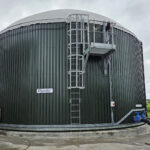
The Irish biomethane opportunity is huge but yet to be mobilised
13th October 2025
Powering change: Ireland’s clean energy future
13th October 2025Renewable Heat Obligation Bill set to be introduced

In line with national climate and energy targets, government has approved the drafting of the Renewable Heat Obligation Bill 2025, which will establish the legislative foundation for the Renewable Heat Obligation (RHO) Scheme.
Due to commence in 2026 and operate until 2045, the scheme aims to reduce Ireland’s reliance on fossil fuels for heating, support indigenous renewable fuel production, and strengthen energy security.
According to SEAI’s National Heat Study, published in 2022, heating accounts for 38 per cent of the State’s energy use, with close to 90 per cent of the State’s fossil fuels imported from abroad. This, combined with the fact that Ireland’s only indigenous source of natural gas in Corrib is soon to be depleted, means that exposure to external energy shocks is set to continue.
The RHO aims to address this by mandating suppliers of natural gas, liquefied petroleum gas, mineral oils, and solid fuels to ensure that a proportion of their supply is renewable.
Obligation levels are to begin at 1.5 per cent in 2026, rising to 3 per cent in 2027, with more ambitious targets expected after a full scheme review in 2028.
Supporting biomethane
A key outcome of the scheme will be the development of the State’s indigenous biomethane sector. Biomethane has been identified as a strategic renewable fuel capable of displacing natural gas in heating while contributing to diversification of supply.
Under the National Biomethane Strategy, the Government is committed to producing 5.7 TWh of biomethane by 2030. Ireland currently produces around 75 GWh of biomethane per year, less than 1 per cent of the 2030 target.
Energy security
The RHO aligns with the Government’s broader energy security objectives. With geopolitical instability impacting international fuel prices and supplies, increasing the proportion of indigenous renewable fuels reduces exposure to external risks both with supply and pricing.
By 2045, the Government aims for the scheme to have transformed the fuel mix of Ireland’s heating sector, ensuring a more stable and secure energy supply for households, businesses, and public services.
While the introduction of renewable content into fossil fuel supply carries cost implications, the design of the scheme seeks to balance climate ambition with affordability. Certificate trading and a buy-out option will provide flexibility for obligated suppliers, reducing compliance costs and minimising the impact on end-users.
Scheme governance
The National Oil Reserves Agency (NORA) has been appointed scheme administrator. Its responsibilities will include issuing renewable heat obligation certificates, monitoring compliance, and managing the buy-out fund. The Agency already oversees the Renewable Transport Fuel Obligation (RTFO), meaning it has experience in administering similar systems.
To fund administration, the Bill also establishes a renewable heat levy on suppliers of renewable fuels, set at a modest €0.001 per litre of fuel.
The RHO is set to operate for two decades, providing the long-term investment certainty needed to decarbonise the heat sector. Following the initial two years, targets will be adjusted upward in line with market growth, technological development, and Ireland’s legally binding carbon budgets.
